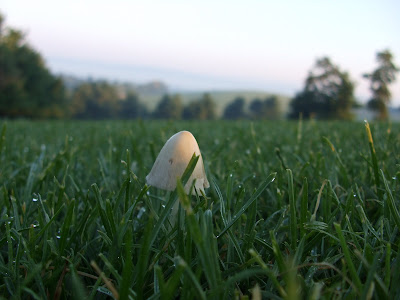Blacksburg is in the Valley & Ridge area, which is just what it implies - a series of long ridges/mountains with valleys between them that run in a southwest to northeast line. Brush Mountain, a classic ridge-mountain, runs beside Blacksburg, extending many miles north of town and terminating with at the New River. You can get some sense of how the ridges run from this photo, taken from the overlook on War Spur Trail. Along the left is Potts Mountain, with War Spur Creek draining into the valley below. On the right, out of view behind the trees, is John's Creek Mountain.
Drainage (that would be creeks and rivers) runs a bit differently in the Blue Ridge than in the Valley & Ridge sections of Appalachia. While there are plenty of creeks and rivers in our neck of the mountains (like the famous Cascades on Little Stony Creek in Giles County), typically they aren't as robust as the streams that drain off the Blue Ridge into the Piedmont. The reasons? Gravity and height - tumbling off the Blue Ridge typically involves a steeper, longer plunge downhill than draining off a ridgeside into a valley. Sure, that's simplified a bit, but there are plenty of examples, one being Rock Castle Creek and the Gorge it carved, described in an earlier post.
Some of the most spectacular, and easily accessible, Blue Ridge creeks are found in North Carolina, particularly in the Pisgah National Forest near Grandfather Mountain. Lost Cove Creek, Harper Creek, Prong Creek, and Wilson Creek drain through the Pisgah National Forest, and there are dozens of miles of streamside trials. There are also many waterfalls, and we made the trek to two of them in June.
Our first hike was on Lost Cove Trail, which goes along Prong Creek. There's a great series of waterfalls on Prong Creek, each a small tumble into a great little swimming hole. The uppermost of this series is pictured below.
 But the real gem is the popular Hunt Fish Falls waterfall and swimming hold extraordinaire. I've been going here for over 30 years, and it's always a treat. If you're lucky and go mid-week you'll miss the crowds that come down the short, .8 mile hike to the stream. We had such luck in June when we found the place deserted. Here are some photos:
But the real gem is the popular Hunt Fish Falls waterfall and swimming hold extraordinaire. I've been going here for over 30 years, and it's always a treat. If you're lucky and go mid-week you'll miss the crowds that come down the short, .8 mile hike to the stream. We had such luck in June when we found the place deserted. Here are some photos:
The view from the rocks near the top of the falls, looking down to the swimming hole. It's deep enough to dive just below here. To the left is the second fall. Turning around from here, you'll see the falls pictured below.


Take another step to the left and you're looking at the waterfall from eye-level. Here's the view upstream. Our favorite campsite is upstream to the right.

Asta's not much of a water dog - nary a bit of Lab blood in her that we can detect. But she really enjoyed the water when were here, wading into the pool, chest-high, to fetch sticks, and scampering across the low rapids at the other end of the swimming hole. Here she eyes the waterfall and warily steps back.

View from across the swimming hole to the falls.









